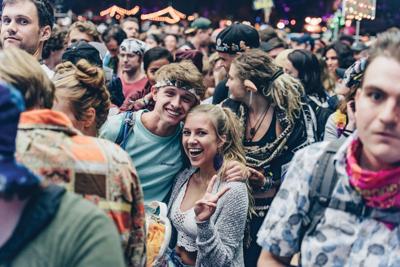We’re not out of the woods yet when it comes to COVID-19, and while venues are open and tours and festivals are happening, the pandemic is still affecting the music world. Throughout the spring, artists — including Mitski, Haim and Lucinda Williams — have had to postpone or cancel shows, or change lineups because of coronavirus outbreaks among their touring parties. Experts say that when fans attend festivals this summer, even if they’re outside, COVID-19 comes with.
Regarding the two area festivals coming up, CMA Fest (June 9-12) has forgone any COVID-19 protocols or suggestions. Its event policy says, “Entry into the Event is voluntary and may involve certain risks, such as personal injury, damage to physical or intellectual property, data loss, and exposure to communicable diseases such as COVID-19.” Bonnaroo (June 16-19) does not have any health-related entry requirements either, yet encourages attendees to test before arriving and wear a mask if unvaccinated. The fest also offers a ticket refund for those who test positive within five days before the festival. “By attending Bonnaroo, you voluntarily assume all risks related to exposure to COVID-19,” the festival’s website reads.
In Davidson County, both reported cases and percentage of positive tests have been on a steady incline again after a spike in January and a low in early March, and hospitalizations have risen slightly in recent weeks.
Dr. William Schaffner, professor of infectious disease at Vanderbilt University School of Medicine, says being outside does reduce the risk of infection substantially. But at festivals, when fans crowd together toward the stage and sing along, the risk ticks up again. Schaffner is also leery of the spaces that often accompany a festival, such as shuttles, hotels, restaurants and bars. He recommends thinking of COVID-19 vaccines as three-dose vaccines — in other words, you need at least your initial two doses and booster to consider it effective. However, Omicron and its subvariants are very contagious, and can even infect people who are up to date on their vaccinations.
“The vaccines are keeping you out of the hospital, but [COVID variants] can still spread,” Schaffner explains. “And if they can spread to you and give you a bad cold, you can spread it to others.”
And if Omicron makes it to people who are immunocompromised, some will be hospitalized. Compared to last year, more people are now vaccinated and more have experience with natural infection of Omicron. But Omicron itself accounts for more than 90 percent of COVID cases, and is much more contagious than Delta at this time last year, Schaffner adds.
“Wearing a mask — particularly one of the N95 or KN95 masks — will somewhat reduce your risk,” says Schaffner. “Although, if you’re in a large group and everybody’s singing and shouting and having a good time, those activities can overwhelm your mask, because masks are not perfect.”
Whether or not to attend big gatherings is something those who are in a high-risk group should be thinking hard about, he continues. Festivalgoers should exercise caution regarding who they are around in the days following the event to thwart possibly spreading the virus to someone who is immunocompromised.
“When you attend these events, you can be sure that Omicron is attending with you. It will be there. People will bring it, and there will be some transmission in these circumstances. … I hope people have fun and keep their risk to a minimum, but there will be some spread, I’m afraid.”
The who, what, where, when and why of Bonnaroo and CMA Fest 2022






